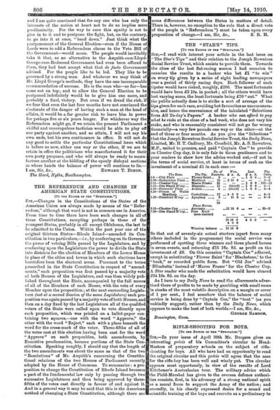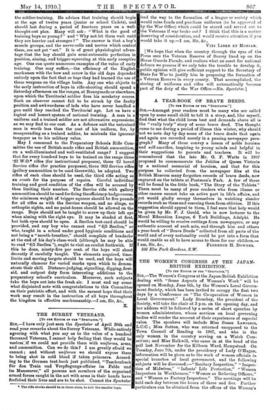RIFLE-SHOOTING FOR BOYS.
[To THE EDITOR OP THE " SPECTATOR."]
Six,—In your issue of April 30th Mr. Burgess gives an interesting precis of his Committee's circular to Head- Masters of preparatory schools on the subject of rifle- shooting for boys. All who have had an opportunity to read the original circular and this précis will agree that the case for the rifle-boy has been well and wisely put. The circular appears most opportunely, in view of the results of Lord Kitchener's Australasian tour. The military advice which the Field-Marshal has given to the oversea defence authori- ties consists, first, in his advocacy of a strong national spirit as a moral force to support the Army of the nation ; and secondly, in his clearly expressed desire for a sound and scientific training of the boys and recruits as a preliminary to the soldier-training. He advises that training should begin at the age of twelve years (junior or school Cadets), and should last during a period of fourteen years on a well- thought-out plan. Many will ask : "What is the good of training boys so young P" and "Why not let them wait until they are heavier and stronger P" The answer is that a boy's muscle groups, and the nerve-cells and nerves which control them, are not yet "set." It is of great physiological advan- tage that the boy should gain semi-automatic perfection in position, aiming, and trigger-squeezing at this early receptive age. One can quote numerous examples of the value of early training. One may suffice,—the efficiency of the English marksmen with the bow and arrow in the old days depended entirely upon the fact that as boys they had learned the use of these weapons on the village butts. Any one who objects to the early instruction of boys in rifle-shooting should spend a Saturday afternoon on the ranges, at Runnymede or elsewhere, upon which the Territorial soldier fires his musketry course. Such an observer cannot fail to be struck by the faulty position and awkwardness of lads who have never handled a gun until they reached the Territorial age. Let us have a logical and honest system of national training. A man in a uniform and a trained soldier are not alternative expressions, as we may find to our cost. As a defence unit the untrained man is worth less than the cost of his uniform, for, by masquerading as a trained soldier, he misleads the ignorant taxpayer as to his military value.
May I commend to the Preparatory Schools Rifle Com- mittee the use of British-made rifles and British ammunition, on a well-illuminated and well-ventilated range? I suggest that for every hundred boys to be trained on the range three '22 W.0.* rifles (for instructional purposes), three '22 bored Service rifles (for practice purposes), three '303 Service rifles (gallery ammunition to be used therewith), be adopted. Two rifles of each class should be used, the third rifle acting as an ersatz for the purpose of repairs. Careful individual training and good condition of the rifles will be secured by thus limiting their number. The Service rifle with gallery ammunition should be used for firing the efficiency-badge course, the minimum weight of trigger squeeze should be five pounds
for all rifles as with the Service weapon, and no slings, no orthoptie sights, and no paint-boxes should be allowed on the range. Boys should not be taught to screw up their left eye 'when aiming with the right eye. It may be shaded at first, but both eyes should be open. A Snellen test-card should be provided, and any boy who cannot read "6/5 Snellen," or who, taught in a school under good hygienic conditions and not being a "mouth-breather," should complain of headache at the end of his day's class-work (although he may be able to read "6/5 Snellen "), ought to visit an oculist forthwith. If this be done, ninety-five per cent, of the boys will shoot decently if carefully taught. The elements acquired, time- limits and moving targets should be used, and the boys will naturally clamour for varied' marks upon which to demon- strate their skill. Distance-judging, signalling, digging, first- aid, and outpost duty form interesting additions to the preparatory school's curriculum. Moreover, such subjects take the boys out into the fresh air. I must end my some- what disjointed note with congratulations to this Committee on their patriotic effort, and with the earnest hope that their work may result in the instruction of all boys throughout the kingdom in effective marksmanship.—I am, Sir, &c., x.







































 Previous page
Previous page